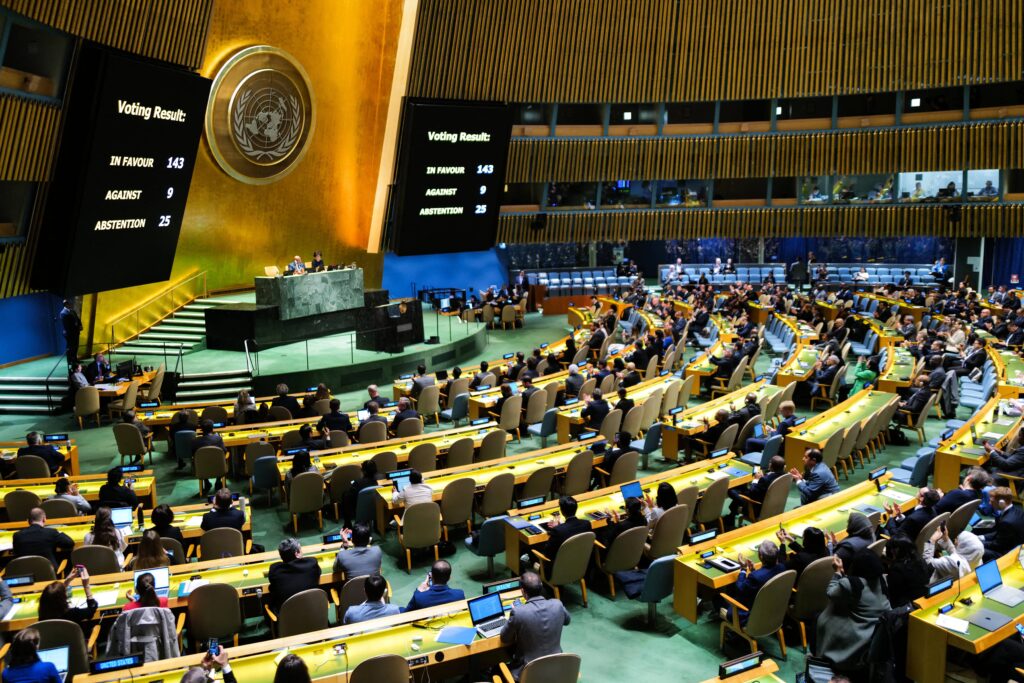With the resolution of May 10, the United Nations General Assembly officially supported Palestine’s application for admission, blocked in the Security Council by the United States‘ veto, stating that it meets the requirements to become a member of the Organization.
It should be remembered that all “peace-loving States” can become members of the United Nations if they accept the obligations established by the Charter of the Organization and, in the opinion of the latter, are capable of respecting them and willing to do so. Admission is decided by the General Assembly, which decides upon a recommendation to that effect from the Security Council (art. 4 United Nations Charter). 193 states are currently members of the United Nations.
Palestine in the United Nations
Since 2012, Palestine has enjoyed the status of non-member observer state at the United Nations, conferred on it by the General Assembly (res. 67/19), given the impossibility of reaching a consensus within the Security Council on the application for admission presented in 2011.
On April 3, Palestine asked to reconsider its application for admission. The Security Council delivered its decision on 18 April. A draft resolution, presented by Algeria, which recommended to the General Assembly to admit the State of Palestine to the United Nations, was put to the vote, obtaining 12 votes in favor, 2 abstentions and only one vote against, that of the United States, who have veto power like the other four permanent members of the Council. In practice, the US veto prevented the adoption of the recommendation.
The last time a permanent member of the Security Council vetoed the admission of a new state was in 1976. The United States thus blocked the application for admission of the newly formed Socialist Republic of Vietnam. It was able to become a member of the UN the following year, once the US opposition waned (res. 32/2).
The resolution of the General Assembly
As it did on that occasion (res. 31/21), last Friday the General Assembly affirmed that the candidate meets the requirements for admission and recommended that the Security Council reconsider his application favorably. Furthermore, it granted Palestine additional rights to those it already had, including the right to sit among the member states in alphabetical order and to submit and present proposals and amendments, even on behalf of a group of states, in the Assembly itself as well as the right to full participation in United Nations conferences. The right to vote in the General Assembly and the right to stand as a member of other United Nations bodies remain excluded.
The resolution was adopted with a majority far exceeding the required two-thirds of members present and voting (art. 18, par. 2, UN Charter). 143 states voted in favor, including France, the Russian Federation and China. Only 9 states voted against it, namely Israel, the United States, Argentina, Hungary, the Czech Republic, Micronesia, Nauru, Palau and Papua New Guinea. There were 25 abstentions, including those of Germany, the United Kingdom and Italy. As on other occasions, the member states of the European Union have divided.
The Italian permanent representative to the UN, the Amb. Maurizio Massari, motivated his abstention with the Government’s belief that a lasting solution to the Israeli-Palestinian conflict, based on the “two peoples-two States” principle, must be obtained through direct negotiations between the parties and with the doubt that the approval of the resolution can contribute to it.
Political meaning
In fact, the resolution adopted last Friday is unable to concretely contribute to achieving peace between Israelis and Palestinians. First, the Security Council has no obligation to follow up on the General Assembly’s recommendation. Secondly, even if the United States gave the green light to the admission of Palestine to the UN, the latter would not in itself lead to the end of hostilities, the release of the hostages by Hamas and the withdrawal of Israel from the Territories occupied Palestinians.
However, the Assembly resolution has great political significance. Faced with the brutal attack by Hamas on 7 October 2023 and the scale of Israel’s reaction, which caused over thirty-four thousand deaths, sixty percent of whom were children, women and the elderly, and one million seven hundred thousand displaced (United Nations data updated to 8 May), the resolution highlights the growing isolation of the US position and the conviction of the great majority of the states of the international community that a change of pace in the efforts to achieve the “two peoples-two states” solution, which allows to welcome Palestine among the members of the greatest world organization as soon as possible.
With regard to the satisfaction of the requirements of statehood, in particular that of the existence of a government that effectively and exclusively exercises control over the territory, often invoked against the admission of Palestine to the UN, the practice includes cases in which it was intended in a rather elastic sense. Suffice it to recall the case of Bosnia Herzegovina. The admission of Bosnia and Herzegovina to the United Nations was recommended by the Security Council on 20 May 1992 and decided by the General Assembly on the following 20 July (res. 46/237), although the Government of Sarajevo did not have control of much of the its territory.
Associate Professor of International Law at the Mediterranean University of Reggio Calabria. He is also an adjunct professor of International Criminal Law at LUISS Guido Carli and a member of the Human Rights Review Panel of the European Union Mission EULEX Kosovo.
